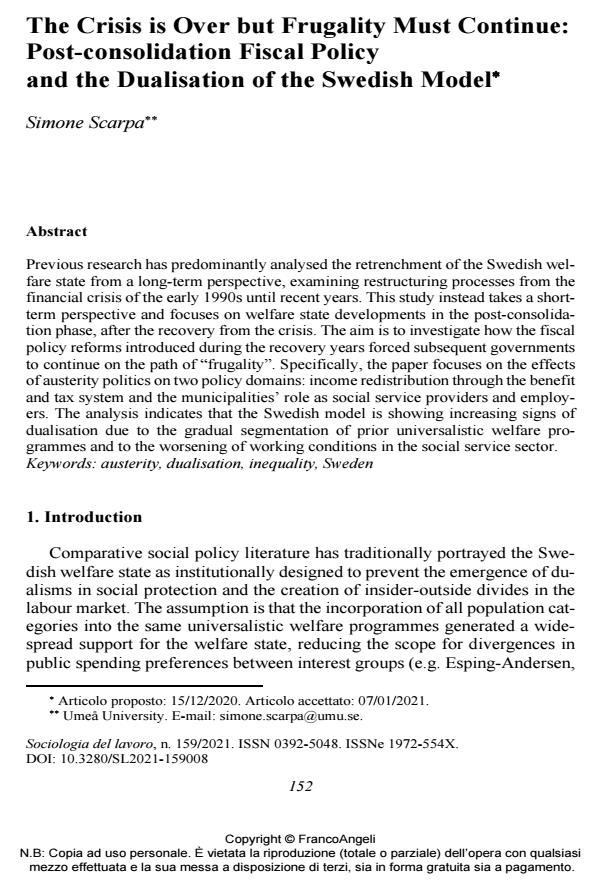The Crisis is Over but Frugality Must Continue: Post-consolidation Fiscal Policy and the Dualisation of the Swedish Model
Titolo Rivista SOCIOLOGIA DEL LAVORO
Autori/Curatori Simone Scarpa
Anno di pubblicazione 2021 Fascicolo 2021/159
Lingua Inglese Numero pagine 20 P. 152-171 Dimensione file 246 KB
DOI 10.3280/SL2021-159008
Il DOI è il codice a barre della proprietà intellettuale: per saperne di più
clicca qui
Qui sotto puoi vedere in anteprima la prima pagina di questo articolo.
Se questo articolo ti interessa, lo puoi acquistare (e scaricare in formato pdf) seguendo le facili indicazioni per acquistare il download credit. Acquista Download Credits per scaricare questo Articolo in formato PDF

FrancoAngeli è membro della Publishers International Linking Association, Inc (PILA), associazione indipendente e non profit per facilitare (attraverso i servizi tecnologici implementati da CrossRef.org) l’accesso degli studiosi ai contenuti digitali nelle pubblicazioni professionali e scientifiche.
Previous research has predominantly analysed the retrenchment of the Swedish welfare state from a long-term perspective, examining restructuring processes from the financial crisis of the early 1990s until recent years. This study instead takes a short-term perspective and focuses on welfare state developments in the post-consolidation phase, after the recovery from the crisis. The aim is to investigate how the fiscal policy reforms introduced during the recovery years forced subsequent governments to continue on the path of "frugality". Specifically, the paper focuses on the effects of austerity politics on two policy domains: income redistribution through the benefit and tax system and the municipalities’ role as social service providers and employers. The analysis indicates that the Swedish model is showing increasing signs of dualisation due to the gradual segmentation of prior universalistic welfare programmes and to the worsening of working conditions in the social service sector.
Studi precedenti hanno esaminato la ristrutturazione dello stato sociale svedese soprattutto da una prospettiva storica di lungo periodo, a partire dalla crisi finanziaria dei primi anni ‘90 fino ai tempi più recenti. Questo studio considera invece il periodo più breve della fase di post-consolidamento fiscale, successiva cioè alla ripresa economica dalla crisi. L’obiettivo è indagare come le politiche fiscali introdotte negli anni della ripresa economica abbiano costretto i governi successivi a continuare sulla via della “frugalità”. In particolare, l’articolo esamina gli effetti delle politiche di austerità sulle politiche di redistribuzione del reddito tramite il sistema previdenziale e fiscale e sui comuni in quanto erogatori di servizi sociali e datori di lavoro. L’analisi indica che il modello svedese sta mostrando segni crescenti di dualizzazione a causa della graduale segmentazione dei programmi di welfare e del peggioramento delle condizioni di lavoro nel settore dei servizi sociali.
Parole chiave:Mercato del lavoro, dualizzazione, segmentazione, modello svedese, politiche di austerità
Simone Scarpa, The Crisis is Over but Frugality Must Continue: Post-consolidation Fiscal Policy and the Dualisation of the Swedish Model in "SOCIOLOGIA DEL LAVORO " 159/2021, pp 152-171, DOI: 10.3280/SL2021-159008